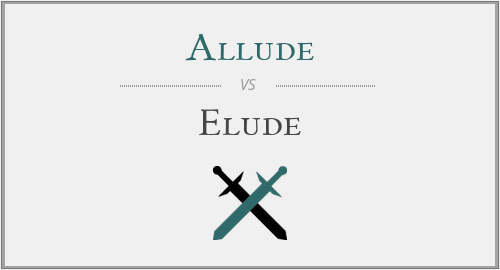He eluded to the problem but did not mention it.
The thief alluded the police.
Can you spot the mistake in the above two sentences? Take a minute to read both sentences carefully and see if you can find a mistake.
If you found it, you are a real genius. If you couldn’t, there is nothing to worry about as this article will tell you all you have to know about these two pair of words.
Allude and elude is a pair of words which sound very similar but have different meanings and spellings. If you need to know more, keep reading.
Origin:
The word allude originated in late 15th century (in the sense ‘hint at, suggest’): from Latin allus-, alludere, from ad- ‘towards’ + ludere ‘to play’. Elude originated in mid-16th century (in the sense ‘delude, baffle’): from Latin eludere, from e- (variant of ex- ) ‘out, away from’ + ludere ‘to play.
Allude as verb:
Allude is used as a verb in English language where it means to suggest or call attention to indirectly; hint at.
She had a way of alluding to Jean but never saying her name.
Allude also means to mention without discussing at length.
We will allude briefly to the main points.
Another meaning of allude is of an artist or a work of art) to recall (an earlier work or style) in such a way as to suggest a relationship with it.
The photographs allude to Italian Baroque painting.
Elude as verb:

Elude is used as a verb which means to escape from or avoid (a danger, enemy, or pursuer), typically in a skilful or cunning way.
He tried to elude the security men by sneaking through a back door.
To avoid compliance with (a law or penalty) is also called elude.
We need to ensure that bad cases do not elude tough penalties.
Elude also implies of an achievement or something desired fail to be attained by (someone).
Sleep still eluded her.
Examples:
The dark-haired woman in “Plumb,” clothed in a faceted, crosshatch pattern that seems to allude to Jasper Johns, has a sleek, black nose that resembles carved marble. [NYT]
The promo has previously been slammed after it appeared to allude to the abusive relationship Rihanna had with her former boyfriend, Chris Brown. [New Zealand Herald]
After all, he had to elude hundreds of zombie-like creatures who relentlessly pursued his character and five other survivors, who ended up taking refuge together in an old house. [My San Antonio]
Second Wimbledon title to elude Maria Sharapova [bettor.com]
Allude or elude:
Elude means to evade or escape from. Allude means to make indirect reference. For example, if say, “I’d love to visit New Orleans, but preferably not in early September,” you might infer that I’m alluding to Hurricane Katrina, which took place in early September. The similarity between the words can make it difficult to remember which word has one “l” and which word has two, so misspellings of “alude” or “ellude” are common. To remember the correct spelling and definition, memorize the sentence “All allude means is to refer to.”




Have a discussion about this article with the community:
Report Comment
We're doing our best to make sure our content is useful, accurate and safe.
If by any chance you spot an inappropriate comment while navigating through our website please use this form to let us know, and we'll take care of it shortly.
Attachment
You need to be logged in to favorite.
Log In